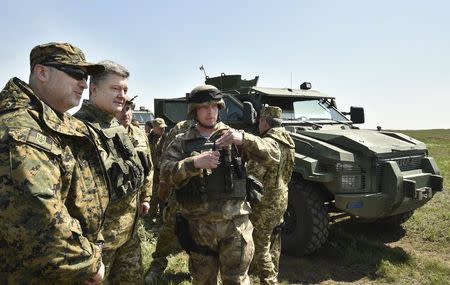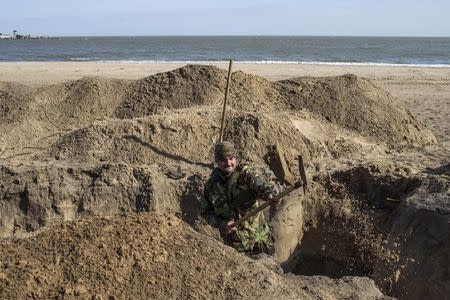Ukraine and pro-Russian separatists trade accusations as Minsk deal frays
By Pavel Polityuk and Jason Bush KIEV/MOSCOW (Reuters) - The Ukrainian military and pro-Russian separatists in eastern Ukraine traded accusations on Saturday, reviving concerns that a peace deal signed in Minsk in February may collapse, although monitors said the violations were still relatively limited. One Ukrainian serviceman was killed and two were wounded when separatists shelled Ukraine's National Guard on Saturday at Shyrokyne, a village east of the port of Mariupol on the Sea of Azov in Ukraine's southeast, Kiev's military said. "Today at 0625 hours, the adversary used 122 mm artillery. They are banned under the Minsk agreements," spokesman Dmytro Gorbunov told the television channel 112. The commander of the battalion that came under fire was separately quoted as saying the serviceman had been killed when a medical vehicle taking him to hospital was fired on. Rebel leaders in eastern Ukraine also stepped up accusations. "Today a rather explosive situation has formed, which demands the urgent intervention of the international community," rebel spokesman Eduard Basurin said, according to the Donetsk News Agency. Basurin said Ukrainian forces had fired on an aid convoy from Russia, killing one person. He later accused them of increasingly frequent attacks and indiscriminate fire on populated areas, Interfax reported. Gleb Kornilov, head of the Foundation for Aid to Novorossiya, a Russian aid organization, told Reuters that an aid column had come under fire from Ukrainian troops near Shyrokyne on Thursday when it accidentally strayed from an agreed route, and that a Russian citizen had been killed. "The convoy didn't try to hide," he said. It was in broad daylight, with flashing lights, with our stickers on all sides. All the same, they opened fire." The Organisation for Security and Co-operation in Europe (OSCE), which is monitoring the ceasefire, said the violations were still limited. "NOT VERY ACTIVE CONFLICT" "We are not in a phase of very active conflict like we have seen in previous months," OSCE Secretary-General Lamberto Zannier told Reuters on the sidelines of a security conference in Estonia. "It looks like it is the local commanders but I agree that, if we don't take these things under control, there is a risk of a larger deterioration, so we have our teams heading back or are already back in that area to engage with the commanders." Another rebel representative, Denis Pushilin, said a fresh build-up of military hardware by Kiev in showed that it was intent on a "military solution of the conflict", according to the Russian news agency RIA. He said the rebels were not opposed to the deployment of international peacekeepers in eastern Ukraine - a long-standing demand by Kiev - but accused Ukraine of violating the Minsk deal by failing to discuss constitutional changes with the rebels. Attending military exercises in southwestern Ukraine, President Petro Poroshenko said: "Ukraine is strictly implementing the Minsk agreements, therefore the Ukrainian armed forces will never attack first." Large quantities of heavy weapons with a caliber of more than 100 mm have been withdrawn by both sides under the Minsk deal, brokered by the leaders of Ukraine, Russia, Germany and France. Yet both sides regularly accuse each other of violating the accord. The Kiev military says rebels are keeping up pressure on the Mariupol, strategically important not least for its position between rebel-controlled eastern regions and the Crimean Peninsula, which was annexed by Russia in March 2014. More than 6,100 people have been killed in the conflict, which erupted in the Russian-speaking east after Russia seized Crimea following the overthrow of a Moscow-backed president in Kiev. (Writing by Richard Balmforth and Jason Bush; additional reporting by David Mardiste in Tallinn; Editing by Janet Lawrence and Kevin Liffey)



